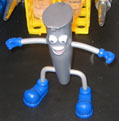There are a number of things that we do on the path to becoming physicians. Many of them, like taking the MCAT, passing organic chemistry, and submitting an AMCAS application can be considered "Rites of Passage." Among the litany of hoops that we jump through, reading the House of God by Samuel Shem is perhaps one of the most important things an aspiring doctor can do before starting medical school. Although a bit dated, the description of the realities doctors must face is essential for anyone considering the profession. Grey's Anatomy, ER, Scrubs, etc. really don't capture many of the horrors that real doctors must endure during their training. This includes dealing with incoherent patients, incompetent colleagues, and an endless stream of work that keeps you elbows deep in the body cavities of "gomers" (old people). Moreover, the stressful lifestyle begins to take a toll on your personality and relationships with others. The main character, Dr. Roy Basch, is a "red-hot" graduate of a prestigious medcial school and enters his first year of a internal medicine internship with all the best intentions. Through the relentless workload, overzealous and out-of-touch-with-reality Slurpers (kiss assess), and his own depression he loses himself and converts into a jaded and cynical doctor that hates himself and everyone else around him. The transformation is startling but understandable given the circumstances. The system just considers it "the way things are done" and doesn't take into account that times have changed and so have the demands of doctors. Something is definitely wrong with the way doctors are taught to take care of people.
I read the book because, like I mentioned above, it is a Rite of Passage that pre-meds go through - for good reason. The LAWS of the House of God are still quoted by practicing physicians and are worth knowing/thinking about. In particular, it is worth spending some time pondering the role of medicine in staving off death, but at what cost? Can treating a disease make things worse? What role do doctors play in death and controlling the autonomy of a patient over their own life? Although the book was written back in the 70's, we still don't have definitive answers to these questions, but more and more technologies are coming online that will let us prolong life without the necessary ethical considerations in place for administering end of life care.
I highly recommend that anyone considering a career as a doctor pick the book up, read it, and consider if you still want to be a physician. Like the Med School Hell blog, it will open your eyes to the career path that you are considering. Thankfully, there are now laws in place to prevent the insane workload imposed on recent intern/resident graduates - but these restrictions are not always followed.
Relevance Rating: 10/10.
Tuesday, December 12, 2006
Subscribe to:
Post Comments (Atom)


No comments:
Post a Comment